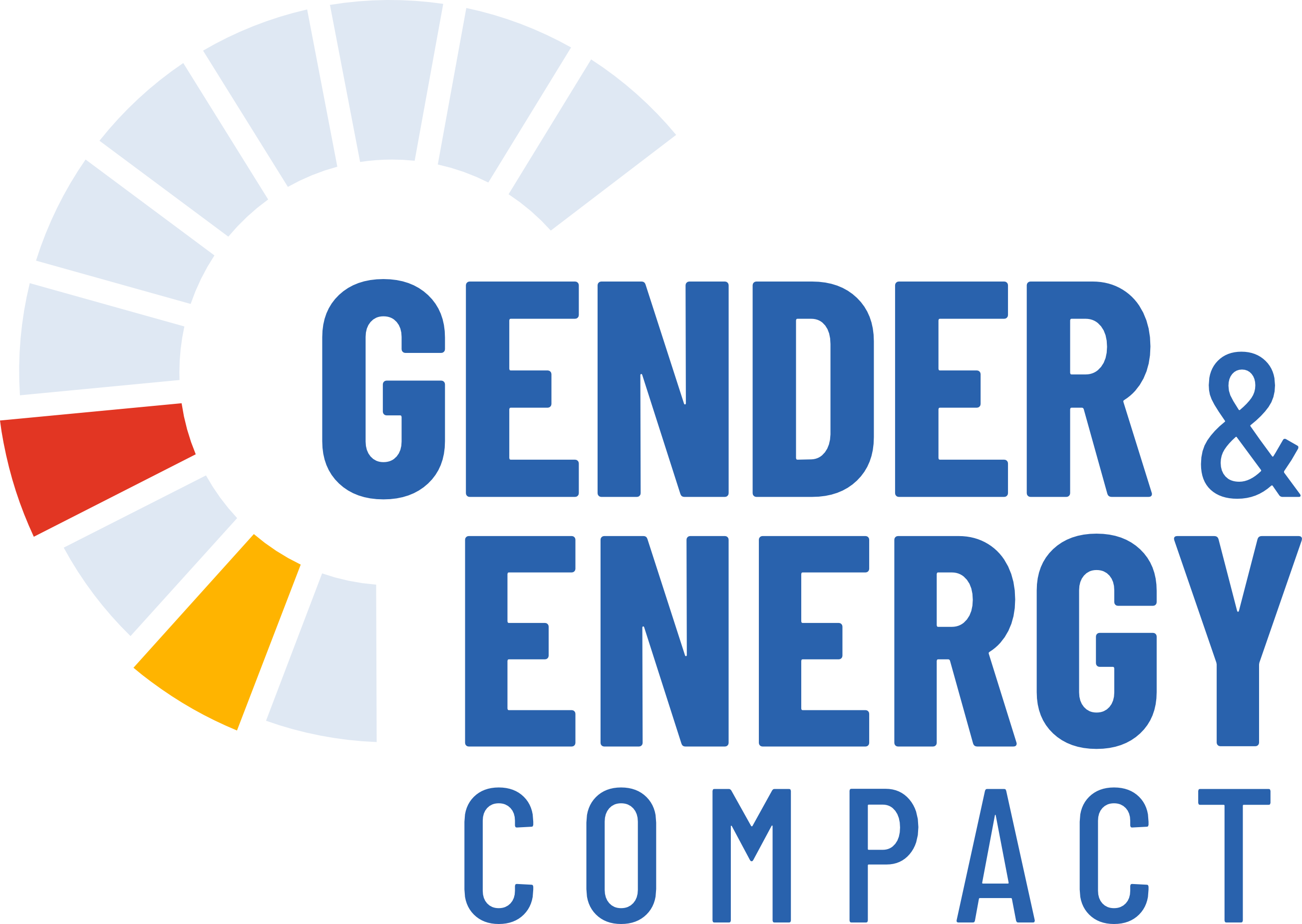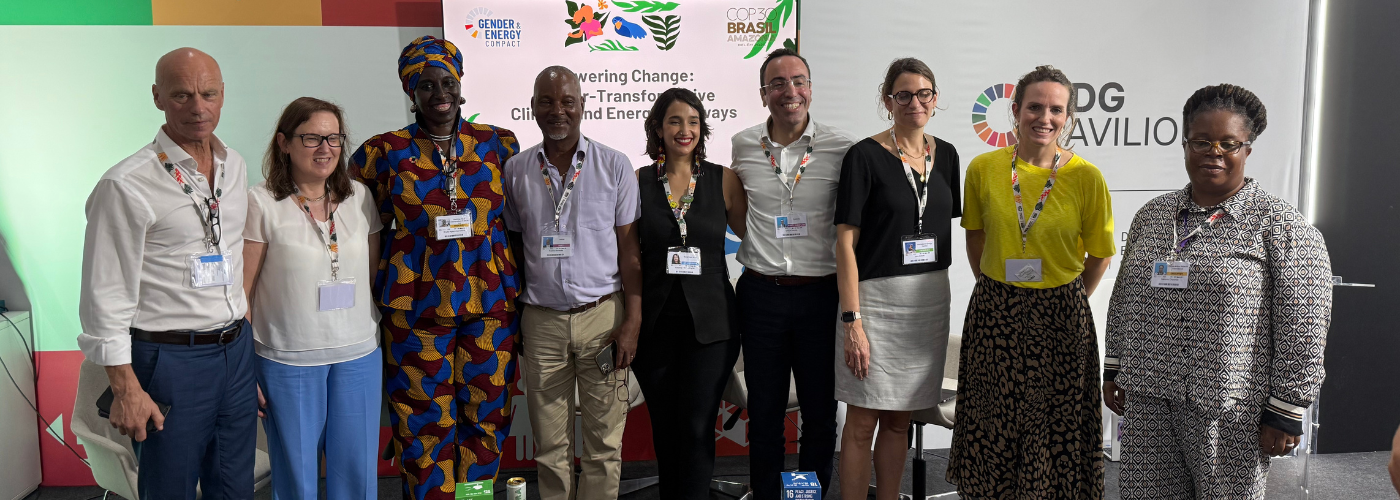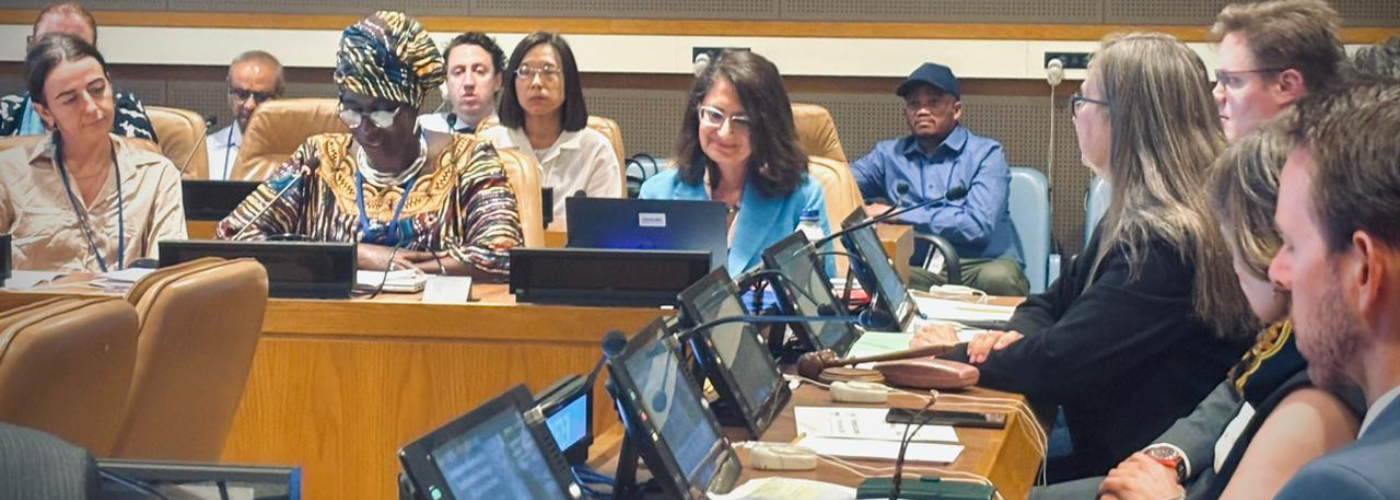By Milena Megrè
The energy transition is often measured through technical data focused on climate targets, installed gigawatts, technological innovations, and energy source distribution. However, there are lives, homes, and people behind every piece of data. This data often overlooks the realities of women and youth, who are disproportionately affected by climate change yet excluded from decision-making.
Addressing this issue was at the heart of the “Empowering Women in Leadership: Innovations, Finance, and Inclusive Transitions in Clean Energy” session, co-hosted by Sustainable Energy for All (SEforALL), the Ministry for Foreign Affairs of the Government of Iceland, and the Gender & Energy Compact, at the SEforALL Global Forum in Bridgetown, Barbados.
Hosting the Forum in Barbados was both strategic and emblematic. Bringing one of the largest international events to discuss sustainable energy to a Caribbean island acknowledged and reinforced the political and symbolic importance of Small Island Developing States (SIDS) in the energy transition debate. The message is clear: we cannot achieve a just and inclusive energy transition without listening, including, and strengthening the voices of the regions that are vulnerable and historically marginalized in global discussions.
This is especially relevant as we build the paths towards COP30 in Belém do Pará, Brazil, which aims for greater inclusion, and focuses on the vulnerabilities of the Global South.
Promoting these discussions is paramount for climate and energy professionals to refine our perspective and advocate for better fair and inclusive energy transition results and policies in both national and international spaces.
The urgency of data and accountability
A key point emphasized during the Forum was the urgent need for gender-disaggregated data, initially called for by Dr. Fanny Misfeldt-Ringius of ESMAP.
As Ms. Sheila Oparaocha, Director of ENERGIA Network, noted, “What is not measured is not prioritized.”
Without clear data on participation, access, and impact, gaps remain invisible and, thus, unchanged. This lack of data is not only a technical aspect but also a structural one, since it prevents the monitoring and accountability of the commitments made.
Ms. Raquel Moses, CEO of Caribbean Climate-Smart Accelerator, stressed that if we do not demand data to be collected and published in an accessible and transparent manner, then there is no incentive to transform our realities. Data serves as a tool for accountability, visibility, and justice, reflecting lived realities and enabling effective decision-making and progress measurement.
As Former Co-Chair of T20 Brazil, I shared that even among the G20 economies, gender-disaggregated data in the energy sector is scarce, from women’s representation in energy ministries and agencies, to workforce, and energy access. There is also a significant lack of intersectional data considering race, age, disabilities, regionality, and socioeconomic factors, which confirms how these inequalities remain overlooked.
Speakers recommended that governments and international organizations should advance their efforts to collect quality data that reflects the different realities of energy access, aligning with the indicators and goals of Sustainable Development Goal (SDG) 7, which aims to “ensure access to affordable, reliable, sustainable and modern energy for all”.
Looking at the Caribbean: towards a tailored approach
A key takeaway from the discussion was the need to avoid generalizations that overlook different realities. The Caribbean region–often grouped under the broader Latin American context—has specific characteristics that cannot be ignored. As a part of the SIDS, the Caribbean faces unique vulnerabilities to the climate crisis, alongside structural economic challenges and historical barriers to the inclusion of women and the youth in decision-making spaces.
Quite often, we see Latin America and the Caribbean treated as a homogeneous region, without due consideration for differences in language, culture, history, and socioeconomic conditions. This tendency often silences Caribbean youth and women and prevents policies and investments from being properly directed to meet their specific needs. These issues were widely recognized by the speakers and the audience, confirming that this remains a persistent obstacle in the region.
A particularly important indicator in the gender discussion is access to clean cooking fuels, as this issue is often closely linked to both gender and youth. Cooking and household energy tasks are predominantly assigned to women, particularly in contexts where children and adolescents are present in the household.
According to the International Renewable Energy Agency (IRENA), in 2021, nearly half of the population in SIDS countries lacked access to clean cooking fuels. Across the Caribbean, access to clean fuels and technologies for cooking is consistently lower than access to electricity. For instance, in
Haiti, the most vulnerable country among the SIDs, less than 10% of the population has access to clean cooking fuels and technologies. These figures therefore indicate a gender gap and an increased vulnerability for women and young people who are disproportionately affected by this reality.
Strong female leadership and community-focused solutions play a crucial role in addressing the challenges posed to the Caribbean. The work of the Ashley Lashley Foundation in Barbados demonstrates this. At 19 years old, Ms. Ashley Lashley established her Foundation with a focus on youth and the intersection of climate on health and justice; her organization’s employ is composed of 99% women under 30 years old.
Such initiatives are crucial to ensure that women and youth have their voices heard and incorporated into decision-making, particularly important with given the strong potential of the renewable energy market to generate jobs and income for women and the youth.
Local leadership and community participation
The “Empowering Women in Leadership” session also emphasized that energy transition measures must adopt a bottom-up approach. Centralized policies that fail to establish meaningful dialogue with local communities are unlikely to meet the real needs of the population.
The experiences shared during the session demonstrated that when local leadership, particularly women in leadership, are genuinely engaged in shaping solutions, more effective and inclusive policies emerge. This trend was evidenced by the remarks of Hon. María Erla Marelsdóttir, from the Ministry of Foreign Affairs of Iceland, a country that currently ranks first in the World Economic Forum’s Gender Index.
One remarkable solution to the need for participatory policy creation is COMET, a digital tool for community-driven data collection. This tool has been used in Fiji, a SIDs country, showcasing how certain data collection processes can become a powerful instrument for empowerment. The co-founder of COMET, Ms. Ayu Abdullah, shared how promoting safe and engaging spaces for women and young people strengthens their autonomy and ensures that energy solutions reflect their realities.
From the exception to the norm: gender-focused finance
Importantly the session addressed how access to finance remains one of the main obstacles for women and young people to lead the energy transition. The transition away from gender-blind financial structures, those that disregard women and their specific needs and exclude them from benefiting from these initiatives, was discussed by Ms. Bola Adesola, Chair of Ecobank.
Examples of promising solutions were presented, such as Ecobank’s Elevate program and gender-sensitive blended finance models, which demonstrate that it is possible to build more accessible and inclusive financial instruments. Moreover, it became clear that if we mean for real change to occur, it is necessary to institutionalize such practices, establish clear targets, create gender indicators, and strengthen accountability mechanisms.
This urgency was also highlighted by Dr. Nawal Al-Hosany, Permanent Representative of the United Arab Emirates to IRENA, who warned of the lack of mechanisms to track investments directed towards gender-focused projects in the New Collective Quantified Goal (NCQG), a climate finance target. Gender-responsive finance cannot be limited to providing credit; it needs to be accompanied by technical support, capacity building, and structural changes that remove historical barriers to women’s and youth’s participation.
With this in mind, it is important to reflect on the debate around climate financing. As we aim to reach a target of $1.3 trillion in climate financing by 2035, in adherence with the NCQG set during the COP30 negotiations, we ensure that mechanisms exist to track gender-responsive projects, ensure that gender issues are being adequately addressed, and mitigate systemic gaps.
Inclusive spaces: a possible path
Despite the challenges highlighted, the SEforALL Global Forum provided a concrete example of what is possible when inclusion is treated as a priority. The Forum constituted a true space for diversity and inclusion, with a large presence of women leaders and young professionals actively contributing as speakers in the sessions, which was the result of a conscious effort on the part of the organization to ensure the representation of women and young people, especially those from the Global South. The Forum exemplifies that building truly inclusive spaces requires effort, commitment, and intentionality. It is not the result of chance, but of a clear political decision.
Several successful cases and businesses were presented, sharing paths to concrete actions and results. At the end of the “Empowering Women in Leadership” session, Ms. Damilola Ogunbiyi, CEO of SEforALL and Special Representative of the UN Secretary-General, shared invaluable insights derived from her experience, highlighting the importance of mentorship in challenging moments, as a crucial tool to support emerging female leaders.
Ms. Ogunbiyi also stressed the need to stop asking for permission to promote diversity and to ensure that younger generations, particularly girls, see that leadership spaces are accessible to them. As Ms. Ogunbiyi stressed, “We need to come together when things are hard, not when things are working”.
This message demonstrated that we must face the persistent challenges in creating a truly inclusive space for women and the youth head on. As was the spirit of the Forum: inclusion is not an accessory, but a condition for the success of the energy transition.
Overall, the “Empowering Women in Leadership” session reinforced a consensus that is growing stronger in climate and energy dialogue spaces, with experts from different regions agreeing that without intentionality, there is no inclusion. Gender and youth inequalities in the energy transition will not disappear naturally, they require strategic action, targeted investments and a structural change in the way the sector is planned and implemented.
The path forward requires more than dialogue and declarations, requiring concrete actions — governments need to publish gender-disaggregated data, financial institutions must incorporate gender markers into their instruments, and it is imperative to recognize and strengthen community-based solutions. The specificities of each region, as exemplified by the Caribbean, need to be respected and integrated into policies and investments. Finally, gender and youth need to move from being treated as secondary issues to occupying decision-making spaces, not just in the future, but starting today.
If we take the lessons learned and shared during this session beyond the Forum, apply them to our future work, amplify them in other spaces, demand accountability, and actively advocate for the inclusion of women and youth, we will create the conditions for real change. By integrating these principles into our initiatives and supporting women and young people to develop their own businesses and lead solutions, we will not only multiply the impact of these actions but also ensure that more voices are heard, valued, and reflected in the energy transition










